Silver Donald Cameron and various associates have completed numerous commissions for a wide array of public and private-sector clients. The assignments have included booklets, policy statements, speeches for federal and provincial ministers, radio spots, seminars, instruction manuals, press releases, and various other editorial tasks. For a partial list of clients, click here.
In recent years, Silver Donald’s most substantial and rewarding assignments have been what he calls “the little square books.”
The Little Square Books
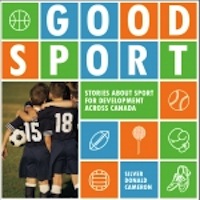
“What you do,” said my new client, “is to show where the money goes. For foundations and governments, when we make a grant, the money just disappears. Your work shows where it goes. You show that the money was not wasted.”
That’s a brilliant description of my work as a contractor. I show where the money went. I show that it wasn’t wasted. In particular, that’s exactly what the Little Square Books are about, and I’m astonished that more foundations and agencies don’t publish similar accounts. If you believe that your granting really does some good, you presumably want others to understand its value – and you want other organizations to emulate it. How can that happen if you don’t present the actual results to the world in some very digestible form?
Telling those stories has become a little specialty of mine, and apparently I’ve become pretty good at it. The J.W. McConnell Family Foundation has been involved in supporting all six of the Little Square Books, and it directly commissioned the two newest ones. The most recent one is Good Sport: Stories about Sport for Development Across Canada Those who want to read this latest Little Square Book can download a copy just by clicking here.
And what is “good sport?” The concept of “sport for development” is that sport touches almost every household, involves people of every age and station, and brings them together to pursue shared goals. So, starting with sport, you can build community even in the most dispossessed neighbourhoods. This book tells how that’s been done from the Downtown Eastside of Vancouver to the suburbs of Montreal, from the roughest neighbourhoods in Winnipeg to the First Nations of James Bay. It’s an inspiring idea, and it’s spreading across the nation.
The previous Little Square Book is Getting Wisdom: Community Service Learning in Canadian Universities. My editor,
Peter Norman, called this one Little Square Book “sharp, readable, entertaining and bursting with good stories. You’ve
worked your magic at taking potentially dry material and infusing it with the enthusiasm and humanity that are
contagious elements of your work.”

And Tim Brodhead, then the President and CEO of the J. W. McConnell Family Foundation, described the booklet as “gripping, penetrating and very readable. You really nailed the concept as well as raising the the criticisms in a very constructive fashion. A nice mix of experiences, and some moving personal stories. Congratulations!” Well, thank you, Tim. Both for the kind words, and for giving me the chance to learn about and discuss these great experiments in creating social change.
Those who want a Little Square Book of their own should just click here. And those who would like to know more about the evolution of the Little Square Books over the course of the past decade can just read on.
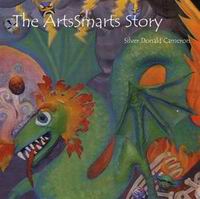
In 2000, the Canadian Conference of the Arts put out a Request for Proposals to write a vivid account of the ArtsSmarts program, which integrates the arts into the regular curriculum – using music to teach history, sculpture to teach science, and so on. Silver Donald Cameron made a successful proposal, and the result was The ArtsSmarts Story, an elegant illustrated booklet published in an 8.5″ square format. The ArtsSmarts Story can be downloaded here.
The ArtsSmarts Story was extremely successful. The CCA sent the booklet to every MP, every newspaper and every school district in Canada just for starters, and reported that it had a remarkable impact. The most powerful way to describe a human situation is always storytelling, and The ArtsSmarts Story took readers right into classrooms across the country to show adventurous teachers and turned-on students learning together, creating art as a way of mastering math, science, history, geology.

The ArtsSmarts Story prompted Carleton University’s Community Economic Development Technical Assistance Program (CEDTAP) to commission Silver Donald to write a similar booklet on the various projects which CEDTAP had funded across the country. Ideas, Energy, Ambition, Dreams: Stories of Community-Driven Economic Initiatives from Across Canada appeared in 2002, using the same square format.
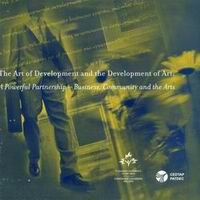
The success of the CEDTAP booklet in turn led CEDTAP to join with CCA to commission a third booklet focussed on the interaction between community economic development and the arts – how the arts can stimulate development, and how economic development can benefit from the boldness and imagination which are the artist’s stock-in-trade. The Art of Development and the Development of Art: A Powerful Partnership – Business, Community and the Arts was published in 2003.
Ideas, Energy, Ambition, Dreams and The Art of Development can both be downloaded from the CEDTAP site here.
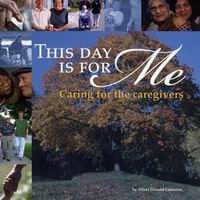
The J.W. McConnell Family Foundation, which had funded the ArtsSmarts program for many years, commissioned a fourth little square book on another national series of projects it had funded on providing respite for caregivers. This Day is for Me: Caring for the Caregivers appeared in 2004. It can be downloaded here.
In March, 2005, the J.W. McConnell Family Foundation was gratified to learn that it had won the Silver Wilmer Shields Rich Award from the Council on Foundations. The Council represents foundations across North America. The ArtsSmarts Story won second place in the Advocacy category for its design, writing and impact. It was one of 248 entries.
This was not the first corporate writing award for Silver Donald Cameron. In 1990, he shared the Bronze Mercury Award for Outstanding Achievement in Professional Communications for his contributions to Maritime Life’s Lifetime project.
Other notable projects
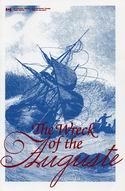
The Wreck of the Auguste (Parks Canada, 1992) is an account of the 1761 wreck of a sailing ship filled with French refugees returning to France after the fall of Quebec. The vessel was wrecked on the coast of Cape Breton Island, where its remains were discovered by divers in 1977.
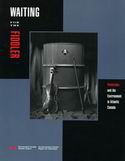
Waiting for the Fiddler (Environment Canada, 1991) is a booklet on the use and abuse of pesticides. (It takes its name from a Stephen Vincent Benet poem about a fiddler who “fiddled so fine/He could fiddle all the bugs off a sweet-potato vine” – making his music the perfect pesticide.)

These Adventurer’s Companions to three of Nova Scotia’s scenic trails were written for Communication Design Group, whose client was Tourism Nova Scotia. The three guides lead the visitor to historic, geological, cultural and environmental sites of interest, including parks, facilities, businesses, museums and industrial locations. They provide detailed directions and background information in spiral-bound booklets designed to fit into a pocket or a glove-box.